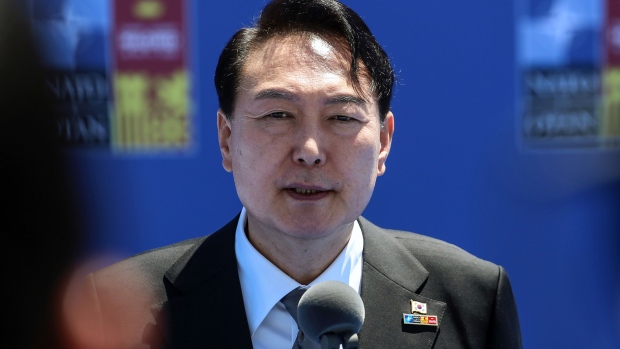Aug 8, 2022
South Korea Minister Offers to Quit in Another Hit for President
, Bloomberg News

(Bloomberg) -- South Korea’s education minister offered to resign over a plan to reduce the school entry age a year to five, which ignited a backlash and dented already weak support for President Yoon Suk Yeol.
Park Soon-ae, one of four women in Yoon’s 18-member cabinet, submitted her resignation Monday, saying she was stepping down after about a month on the job as she faced headwinds against school system reform. Yoon was likely to accept the resignation after deciding last week to remove her from the cabinet, Yonhap News Agency reported.
“I would like to resign my position as education minister,” Park said at a brief news conference covered live on national television. “I take responsibility for all the controversies, including the restructuring of the school system. I pray for a better future for our children.”
The dust up over the school system is one of several stumbles for Yoon that added to the woes of his government as it struggles to find support after about three months in power. The resignation comes in the wake of a decision by Yoon last week to forgo a meeting with Nancy Pelosi, the first sitting US House speaker to visit South Korea in 20 years.
Members of his conservative People Power Party and the progressive opposition Democratic Party criticized Yoon for snubbing an in-person meeting with the powerful politician from the country’s long-time American ally, who had met every other South Korean president over about the past two decades. Yoon’s office said the president held off on a meeting so as not to interrupt his vacation in South Korea and instead spoke to Pelosi by telephone.
About 60% of respondents in a survey by the Korea Society Opinion Institute said it was inappropriate for Yoon not to have met Pelosi.
The outgoing education minister unveiled plans about two weeks ago to lower the age for school entry starting as early as 2025. The government contended the move could ease the burden on parents for childcare as the country tries to increase one of the developed world’s lowest birth rates.
Parents, teachers and civic groups protested, saying it was is a hastily conceived move done with little consultation that could be detrimental to the development of young children and would step up competition in an already overheated education sector.
Since winning a presidential election in March decided by the closest margin in the country’s history, Yoon has seen his support erode. Several major decisions have proved unpopular and touched off waves of criticism, including relocating the presidential office, announcing plans to shut the Gender Equality Ministry and giving his government more power over police.
Yoon’s support rate hit a new low of 24% in a weekly tracking poll released Friday by Gallup Korea, with the approval numbers of his administration ranking among the lowest for any president at the same point in their term since South Korea became a full democracy in 1987.
Yoon is also facing gridlock in parliament that could thwart his policy priorities. The opposition camp holds a majority large enough to shoot down any of his proposals and override any measure that Yoon may veto.
©2022 Bloomberg L.P.







